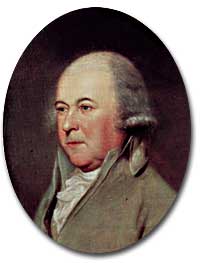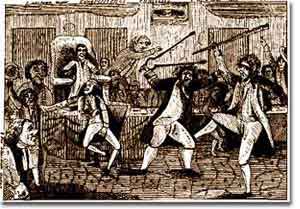19e. The Alien and Sedition Acts

L.F. Tantillo's Return of the Experiment records the arrival of the Experiment in Albany, New York, after its trip to China. It was only the second American ship to journey to Asia.
No protesting the government? No immigrants allowed in? No freedom of the press. Lawmakers jailed? Is this the story of the Soviet Union during the Cold War?
No. It describes the United States in 1798 after the passage of the Alien and Sedition Acts.
The strong steps that Adams took in response to the French foreign threat also included severe repression of domestic protest. A series of laws known collectively as the Alien and Sedition Acts were passed by the Federalist Congress in 1798 and signed into law by President Adams. These laws included new powers to deport foreigners as well as making it harder for new immigrants to vote. Previously a new immigrant would have to reside in the United States for five years before becoming eligible to vote, but a new law raised this to 14 years.

Charles Willson Peale was one of the great artists of early America. Here, John Adams is captured by Peale's paintbrush.
Clearly, the Federalists saw foreigners as a deep threat to American security. As one Federalist in Congress declared, there was no need to "invite hordes of Wild Irishmen, nor the turbulent and disorderly of all the world, to come here with a basic view to distract our tranquillity." Not coincidentally, non-English ethnic groups had been among the core supporters of the Democratic-Republicans in 1796.
The most controversial of the new laws permitting strong government control over individual actions was the Sedition Act. In essence, this Act prohibited public opposition to the government. Fines and imprisonment could be used against those who "write, print, utter, or publish . . . any false, scandalous and malicious writing" against the government.
Under the terms of this law over 20 Democratic-Republican newspaper editors were arrested and some were imprisoned. The most dramatic victim of the law was Representative Matthew Lyon of Vermont. His letter that criticized President Adams' "unbounded thirst for ridiculous pomp, foolish adulation, and self avarice" caused him to be imprisoned. While Federalists sent Lyon to prison for his opinions, his constituents reelected him to Congress even from his jail cell.

A fight in Congress! This image appeared in Harper's New Monthly Magazine nearly a century after the incident between Lyon and Griswold with the poetic caption: "He in a trice struck Griswold thrice / Upon his head enraged, Sir; / Who seized the tongs to ease his wrongs, / And Griswold thus engaged, Sir."
The Sedition Act clearly violated individual protections under the first amendment of the Constitution; however, the practice of "judicial review," whereby the Supreme Court considers the constitutionality of laws was not yet well developed. Furthermore, the justices were all strong Federalists. As a result, Madison and Jefferson directed their opposition to the new laws to state legislatures. The Virginia and Kentucky legislatures passed resolutions declaring the federal laws invalid within their states. The bold challenge to the federal government offered by this strong states' rights position seemed to point toward imminent armed conflict within the United States.
Enormous changes had occurred in the explosive decade of the 1790s. Federalists in government now viewed the persistence of their party as the equivalent of the survival of the republic. This led them to enact and enforce harsh laws. Madison, who had been the chief architect of a strong central government in the Constitution, now was wary of national authority. He actually helped the Kentucky legislature to reject federal law. By placing states rights above those of the federal government, Kentucky and Virginia had established a precedent that would be used to justify the secession of southern states in the Civil War.






